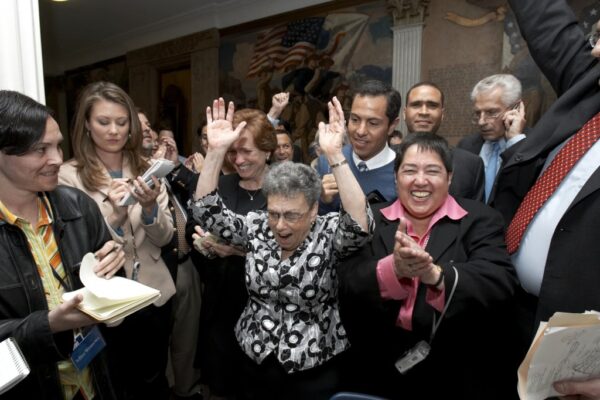On the cusp of a U.S. Supreme Court ruling in just a few days with the potential to make equal marriage rights the law of the entire land, consider this: all the progress we have seen for the freedom to marry over the last decade might have been delayed for years—or might never have happened at all—if not for Massachusetts.
I don’t just mean the Commonwealth’s shot-heard-round-the-world breakthrough for marriage in 2004. Even after GLAD’s Goodridge case, Massachusetts remained the only state in the nation where lesbian and gay couples could marry, for four precarious years.
In that time, Massachusetts faced down two proposed amendments to the state constitution, backed by politicos like then-governor Mitt Romney and former Boston mayor Ray Flynn. Either one of those measures might have uprooted marriage equality.
Losing here might have frozen this national movement for equality, especially since another setback would have closely followed. California became the second state to recognize gay marriage in 2008—but then voters overturned it by a narrow margin with the infamous Prop 8.
In that uncertain time, Massachusetts kept the flame lit.
In the ACLU, we often say that victories for civil rights and civil liberties don’t always stay won, and the fight over marriage in Massachusetts provides a perfect example.
After marriages for lesbian and gay couples started here, the state legislature voted down one anti-marriage amendment in 2005. But in 2007, a second, more menacing amendment banning same-sex marriage advanced, and it needed to clear a low bar: only 50 out of 200 state legislators had to support it.
Across the rest of the country at that time, similar amendments sailed through, passing with more than 50 or 60 percent of the vote in some state legislatures or general elections. Defenders of marriage in Massachusetts faced the daunting task of keeping support for the ban under 25 percent.
We did.
Thanks to a brilliantly conceived and executed campaign led by MassEquality—which the ACLU of Massachusetts worked side by side with, along with the Massachusetts Gay and Lesbian Political Caucus, GLAD, the Freedom to Marry Coalition and other allies—the Massachusetts legislature stopped the proposed amendment. It only got 45 votes, instead of the 50 out of 200 it needed. Less than a quarter of state lawmakers supported it.
Having moved to Massachusetts in 2007, I appreciate and understand firsthand this incredible accomplishment. The previous year, an amendment banning marriage and civil unions passed 59-41 percent in my home state, Wisconsin, as well as in others. We did the best we could there, but I will never forget how it felt to see such a remarkable victory for equality in Massachusetts just a few months after such serious defeats across the rest of the country. Years of groundwork in Massachusetts and the smart and skillful execution of a strategic campaign plan paid off.
The next year, things started to move decisively forward again when Connecticut began marrying lesbian and gay couples. Iowa and Vermont joined in 2009; New Hampshire and D.C. in 2010; New York in 2011; Washington state and Maine in 2012. And starting in 2013, the year that ACLU client Edie Windsor toppled the misnamed "Defense of Marriage Act,” it became a little hard to even keep track of all the breakthroughs.
As in Massachusetts, courts provided the venue for early marriage-equality successes, but some of these wins have come through legislative votes, in states like New Hampshire and Illinois. Additionally, in states like Washington, Maine and Maryland, voters have directly approved equal marriage rights. This nicely puts to rest the argument by opponents that “activist judges” have imposed marriage equality.
Very soon, the Supreme Court will decide marriage cases from four states, and the ACLU represents plaintiffs from two of them: Kentucky and Ohio. We can’t take for granted the final SCOTUS outcome, but winning equal marriage rights in every part of the country has become a real possibility.
For that, we owe thanks for getting to this point to those who have worked in courts, state legislatures and statewide ballot campaigns to make that happen.
We owe thanks to pioneering visionaries, who not only saw this possibility decades before others did, but who actually began working on it. The ACLU filed the first freedom-to-marry lawsuit in the United States decades ago, in 1970.
And we owe thanks to those who stepped up to defend that vision when it became a one-of-a-kind reality in Massachusetts.
Supporters of equality in the Commonwealth have particular reason to feel proud of defending the 2004 Massachusetts breakthrough for the freedom to marry. Keeping the Massachusetts example alive has helped make victories for equality possible in dozens of other states and—in a few days, we hope—the U.S. Supreme Court will recognize the right of lesbian and gay couples to marry throughout the country.
Christopher Ott was communications director for the ACLU of Massachusetts.
Stay Informed
Sign up to be the first to hear about how to take action.
By completing this form, I agree to receive occasional emails per the terms of the ACLU’s privacy statement.
By completing this form, I agree to receive occasional emails per the terms of the ACLU’s privacy statement.

